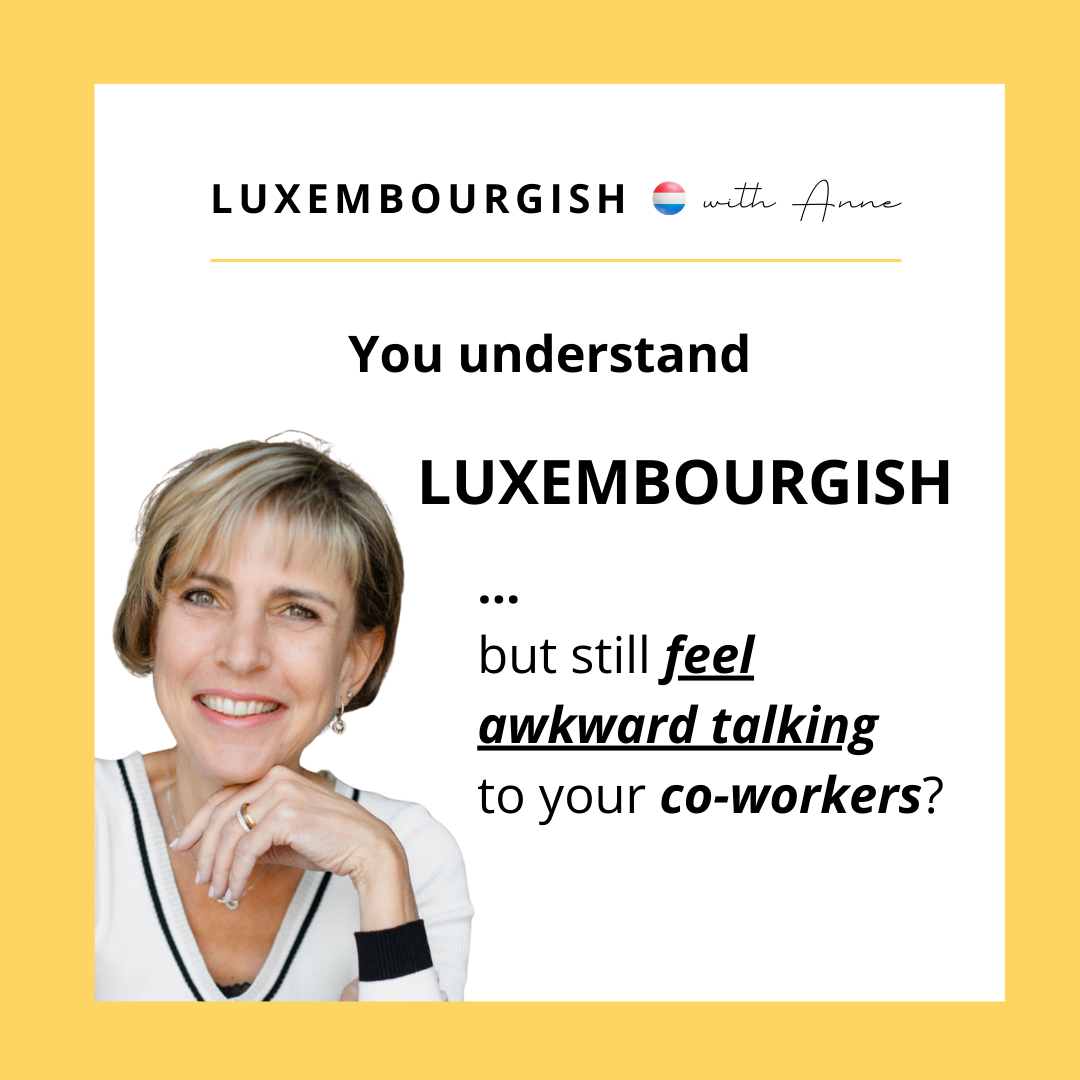Want to say no politely in Luxembourgish without feeling guilty? In this episode, you’ll learn how to say no clearly and kindly in both professional and personal situations. Whether you need to say no in Luxembourgish at work, decline a social invitation, or set boundaries, this episode will give you the exact polite refusals in Luxembourgish that native speakers use.
And learn today how to say no in Luxembourgish by using a simple 3-step framework.

The 3-step framework
1️⃣ Acknowledge the request
🗣 “Ech schätzen et, datt s du mech frees fir …” → I appreciate it …
2️⃣ Give a clear, brief reason
🗣 “Allerdéngs schaffen ech den Ament un engem wichtege Projet.” → However, right now I’m busy working …
3️⃣ End on a positive note
🗣 “Awer soubal ech méi Zäit hunn, wäert ech der hëllefen.” → But as soon as I have more time, I’ll …

How to Say No at Work (Without Looking Unhelpful)
It’s especially hard to say no when a colleague or manager asks you for something. You don’t want to sound unhelpful, but you also don’t want to overcommit.
💡 Here’s how to say no professionally by using the 3-step framework
👉 When someone asks you to take on an extra project:
Ech schätzen et, datt s du mech frees fir dëse Projet. I appreciate you thinking of me for this project.
Allerdéngs schaffen ech den Ament un {Tâche}. However I’m working at the moment on/with [current task].
Ech sinn awer frou fir Dokumentatioun ze deelen, wann dat dir hëlleft. I’d be happy to share resources that might help.”
👉 When your team wants you to stay late:
Ech verstinn datt dat wichteg ass. I understand this is important.
Ech muss haut wéi ëmmer fortgoen. I need to leave at my usual time today,
Allerdéngs kann ech muer de moien éischter kommen, wann dat hëlleft. But I can come in early tomorrow to help.”

How to Handle Persistent People Who Keep Asking
This is where many Luxembourgish learners struggle—what do you do if someone keeps pushing you even after you’ve already said no?
👉 Do NOT leave room for vläicht – maybeAvoid phrases like:
❌ Looss mech driwwer nodenken. Let me think about it.
❌ Ech versiche mäi Bescht ze maachen. l try to do my best.
❌ Ech wéilt, ech kéint, awer …I wish I could, but…
These sound too soft, and people will think you just need a little convincing.
🔹 Instead, stay firm and clear:
Ech bleiwen bei menger éischter Äntwert, an zwar: dat ass leider net méiglech. De Moment schaffen ech un {Tâche} …. dat/déi/dee prioritär ass.
I stick to my 1. answer, namely: that’s not possible unfortunately. Right now I’m working on {current task} which is of prime importance.
This phrase makes it 100% clear that your decision won’t change.

How to Back Out of Something (When You Already Said Yes)
Ever said yes too quickly and then later realized…
💭 Ech hunn wierklech keng Zäit dofir. I really don’t have time for this.
💭 Ech wëll dat net maachen. I don’t want to do this.
Backing out feels stressful, but sometimes, it’s necessary.
✨ The 3-Step Formula for backing out politely:
1️⃣ Apologize sincerely
2️⃣ Briefly explain what changed
3️⃣ Offer an alternative (if possible)
👉 Example:
1️⃣Et deet mer éierlech leed, mee leider kann ech elo awer net e Samschden op derSummerparty aushëllefen. I sincerely apologise , but I need to back out of helping out with the the Summer party.
2️⃣ Ech hunn ze vill Aarbecht doheem nozehuelen, well ech e puer Deeg krank war.
I have too much work to catch up at home, as I have been sick for several days.
Ech kéint awer eng aner Persoun fannen, déi mech ersetze kéint, wann dat hëlleft.
I could find someone else who could take my place, if that helps.
By apologizing, giving a reason, and offering a small solution, you soften the impact of saying no.
If you want to boost your Luxembourgish and especially business language or more advanced Luxembourgish Language, check out our self-study online course Formal and Business Luxembourgish Language Course A2-B1.




